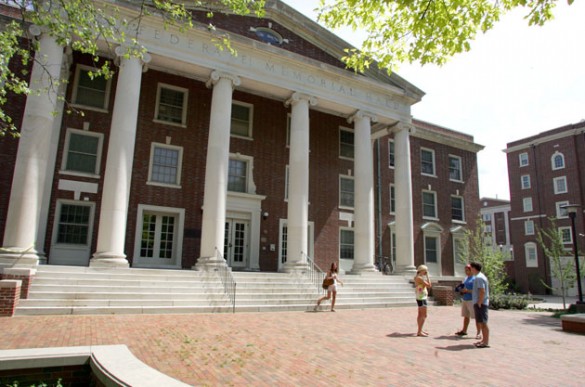
The Vanderbilt community is invited to a panel discussion, “Memorial Hall: Its origin, history, evolution,” on Sunday, Aug. 30, at 6 p.m. at the Student Life Center ballroom.
Chancellor Nicholas S. Zeppos will kick off the event. The panelists will include David Williams, vice chancellor for athletics and university affairs; Richard Blackett, Andrew Jackson Professor of History; James Floyd, associate counsel for the university; and Jalisia Singleton, 2014 Vanderbilt alumnus and co-founder of Hidden Dores, a Vanderbilt student initiative and organization intended to draw attention to the racial and ethnic minority experience on a predominantly white campus. Vanessa Beasley, dean of The Martha Rivers Ingram Commons and associate professor of communication studies, will moderate the discussion.
The Office of the Dean of the Commons, Office of the Dean of Students, Hidden Dores, Vanderbilt Student Government, Black Student Alliance, the Vanderbilt student chapter of the NAACP, Project I Am and the Organization of Black Graduate and Professional Students are collaborators on the event.
National discussion about the continued display of symbols of the Confederacy and questions from Vanderbilt students have prompted further discussion of Memorial Hall, which has the inscription “Confederate Memorial Hall” on the pediment of the building. The inscription stems from a 1933 gift from the Tennessee chapter of the United Daughters of the Confederacy toward the construction of the dormitory that was at the time part of an independent institution known as the George Peabody College for Teachers. In 1979, Vanderbilt merged with George Peabody College and acquired the residence hall.
In 2002, Vanderbilt sought to rename the building “Memorial Hall” and to remove the inscription “Confederate” from the pediment of the building as part of ongoing efforts to create a positive, inclusive environment. Williams was general counsel at Vanderbilt at the time and led the university’s legal strategy.
The Tennessee Division of the United Daughters of the Confederacy, arguing breach of contract, sued Vanderbilt to block the name change and removal of the inscription. The university initially won the case in trial court. However, a Tennessee appeals court ruled in 2005 that Vanderbilt may not drop “Confederate” unless the university returned the donation to Peabody College in 1933 at the value of the donation in current dollars. However, Vanderbilt chose to use those funds, which today would total approximately $900,000, for other purposes rather than enrich an organization whose values it does not share.
The ruling has not prevented the university from dropping “Confederate” in the way it refers to the residence hall in campus publications, maps, websites and housing assignments. Nor did the ruling prevent the university from installing nameplates over all four entrances that read “Memorial.” From the university’s perspective, the residence hall is named Memorial Hall. The name is intended to honor the men and women who have lost their lives in this country’s armed conflicts.
A new plaque has been placed at Memorial Hall that presents a fuller picture of the building’s history—specifically the university’s efforts in 2002 to remove the inscription and the subsequent ruling in 2005.
The Aug. 30 panel discussion is intended to be an opportunity to engage students, faculty and staff in a thoughtful discussion about how Vanderbilt can reconcile vestiges of its past, like the Memorial Hall inscription, with the university’s continued commitment to diversity, equality and inclusion.